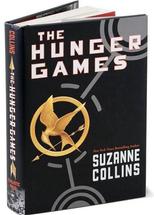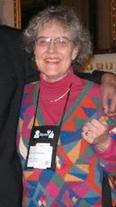In anticipation of The Hunger Games movie opening Friday, an already frenzied media blitz is ratcheting up a few more notches, so it may be a good idea to begin the week by remembering that it all started with the books.  Salon's Laura Miller offered a detailed look at the evolution of the Hunger Games success story, noting that early in the process, "Scholastic employees began eagerly passing the manuscript around the office. It was the first stirring of what would become a tidal wave of word of mouth.... In January, the book's marketing team decided to send out photocopies of the manuscript instead of the nicely bound proofs that are typically submitted to industry professionals before the finished version of a book comes off the presses.... Scholastic sales reps were given a limited number of manuscripts to distribute to their list of 'Big Mouths,' children's publishing lingo for booksellers who have exceptional influence with co-workers and peers.... That spring, a full six months before The Hunger Games was set to publish, the official advance reader’s copies were among some of the most sought-after items at the conferences and conventions where publishers present their titles to booksellers and librarians."
Salon's Laura Miller offered a detailed look at the evolution of the Hunger Games success story, noting that early in the process, "Scholastic employees began eagerly passing the manuscript around the office. It was the first stirring of what would become a tidal wave of word of mouth.... In January, the book's marketing team decided to send out photocopies of the manuscript instead of the nicely bound proofs that are typically submitted to industry professionals before the finished version of a book comes off the presses.... Scholastic sales reps were given a limited number of manuscripts to distribute to their list of 'Big Mouths,' children's publishing lingo for booksellers who have exceptional influence with co-workers and peers.... That spring, a full six months before The Hunger Games was set to publish, the official advance reader’s copies were among some of the most sought-after items at the conferences and conventions where publishers present their titles to booksellers and librarians."  The Hunger Games hit what Carol Chittenden, co-owner of Eight Cousins bookstore, Falmouth, Mass., called "the sweet spot of the market." Owens wrote that the characters and primary story elements in the book appeal "to a wide spectrum of teen and tween readers. Parents, teachers and librarians seize on the social and political commentary in the novel’s depiction of an authoritarian government, an exploited underclass and reality-TV voyeurism pushed to grotesque extremes."
The Hunger Games hit what Carol Chittenden, co-owner of Eight Cousins bookstore, Falmouth, Mass., called "the sweet spot of the market." Owens wrote that the characters and primary story elements in the book appeal "to a wide spectrum of teen and tween readers. Parents, teachers and librarians seize on the social and political commentary in the novel’s depiction of an authoritarian government, an exploited underclass and reality-TV voyeurism pushed to grotesque extremes."
Ultimately, kids "loved it just as much as all those adults who have made it their life’s work to discover the books kids will love. (Go figure.) From that point, it only got hotter: There is no more fertile petri dish in which to grow world of mouth than a high school," Owens noted. "When Catching Fire was published the following year, it instantly shot to the #1 spot on the USA Today bestseller list."
---
The momentum has certainly not waned, particularly as the movie's release date approaches. For nine of the past 10 weeks, the Hunger Games trilogy has held the top three spots on USA Today's bestseller list, with the box set ranked #6. A pair of companion books are making their mark as well: The Hunger Games Tribute Guide is #43 and The Hunger Games: Official Illustrated Movie Companion is #49.
---
Amazon reported that Suzanne Collins is the bestselling Kindle author of all time and released a list of the top cities in the U.S. reading the Hunger Games trilogy, compiled from sales data of all versions of the books on a per capita basis in cities with more than 100,000 residents. The top 20 are:
- Sunnyvale, Calif.
- Salt Lake City, Utah
- Tallahassee, Fla.
- Seattle, Wash.
- Orlando, Fla.
- Pittsburgh, Pa.
- St. Louis, Mo.
- Provo, Utah
- San Francisco, Calif.
- Naperville, Ill.
- Washington, D.C.
- Richmond, Va.
- Scottsdale, Ariz.
- Wilmington, N.C.
- Murfreesboro, Tenn.
- Vancouver, Wash.
- Portland, Ore.
- Tampa, Fla.
- Overland Park, Kan.
- Norman, Okla.
---
A profile of Suzanne Collins in the Observer noted that with "her shining grey-blue eyes and cloak of strawberry blonde hair, Collins could play Katniss's mother, concocting healing salves from woodland plants in District 12. When she speaks, she exudes the passionate engagement with ideas that she wants from her readers."
And what does Collins want from her readers? "I want them to ask themselves questions about how elements of the book might be relevant in their own lives, such as, 'How do you feel about the fact that some people take their next meal for granted when so many other people are starving? What's your relationship to reality TV versus your relationship to the news?' " she said. "Too much of people's lives are put on television and we're desensitized to actual tragedy unfolding before us." Regarding the combat violence and death in the books, she observed: "You have to commit fully to writing violent or emotionally challenging scenes. You make that decision at the beginning and stick with it or you write another kind of book."

